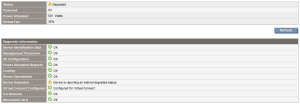Checking disks
root@linux:~ # hpacucli ctrl all show config
Smart Array P410i in Slot 0 (Embedded) (sn: 5001438013682F50)
array A (SAS, Unused Space: 0 MB)
logicaldrive 1 (136.7 GB, RAID 1, OK)
physicaldrive 1I:1:1 (port 1I:box 1:bay 1, SAS, 146 GB, OK)
physicaldrive 1I:1:3 (port 1I:box 1:bay 3, SAS, 146 GB, OK)array B (SAS, Unused Space: 0 MB)
logicaldrive 2 (136.7 GB, RAID 1, OK)
physicaldrive 1I:1:2 (port 1I:box 1:bay 2, SAS, 146 GB, OK)
physicaldrive 1I:1:4 (port 1I:box 1:bay 4, SAS, 146 GB, OK)array C (SAS, Unused Space: 0 MB)
logicaldrive 3 (136.7 GB, RAID 1, OK)
physicaldrive 2I:1:5 (port 2I:box 1:bay 5, SAS, 146 GB, OK)
physicaldrive 2I:1:6 (port 2I:box 1:bay 6, SAS, 146 GB, OK)SEP (Vendor ID PMCSIERA, Model SRC 8x6G) 250 (WWID: 5001438013682F5F)
Listing logical drives
root@linux:~ # hpacucli ctrl slot=0 logicaldrive all show status
logicaldrive 1 (136.7 GB, RAID 1): OK
logicaldrive 2 (136.7 GB, RAID 1): OK
logicaldrive 3 (136.7 GB, RAID 1): OK
Showing physical drives
root@linux:~ # hpacucli ctrl slot=0 pd all show
Smart Array P410i in Slot 0 (Embedded)
array A
physicaldrive 1I:1:1 (port 1I:box 1:bay 1, SAS, 146 GB, OK)
physicaldrive 1I:1:3 (port 1I:box 1:bay 3, SAS, 146 GB, OK)array B
physicaldrive 1I:1:2 (port 1I:box 1:bay 2, SAS, 146 GB, OK)
physicaldrive 1I:1:4 (port 1I:box 1:bay 4, SAS, 146 GB, OK)array C
physicaldrive 2I:1:5 (port 2I:box 1:bay 5, SAS, 146 GB, OK)
physicaldrive 2I:1:6 (port 2I:box 1:bay 6, SAS, 146 GB, OK)
Two disks were inserted
Checking status again
root@linux:~ # hpacucli ctrl slot=0 pd all show
Smart Array P410i in Slot 0 (Embedded)
array A
physicaldrive 1I:1:1 (port 1I:box 1:bay 1, SAS, 146 GB, OK)
physicaldrive 1I:1:3 (port 1I:box 1:bay 3, SAS, 146 GB, OK)array B
physicaldrive 1I:1:2 (port 1I:box 1:bay 2, SAS, 146 GB, OK)
physicaldrive 1I:1:4 (port 1I:box 1:bay 4, SAS, 146 GB, OK)array C
physicaldrive 2I:1:5 (port 2I:box 1:bay 5, SAS, 146 GB, OK)
physicaldrive 2I:1:6 (port 2I:box 1:bay 6, SAS, 146 GB, OK)unassigned
physicaldrive 2I:1:7 (port 2I:box 1:bay 7, SAS, 146 GB, OK)
physicaldrive 2I:1:8 (port 2I:box 1:bay 8, SAS, 146 GB, OK)
Creating a new logical drive with mirror
root@linux:~ # hpacucli ctrl slot=0 create type=ld drives=2I:1:7,2I:1:8 raid=1
root@linux:~ # hpacucli ctrl all show config
Smart Array P410i in Slot 0 (Embedded) (sn: 5001438013682F50)
array A (SAS, Unused Space: 0 MB)
logicaldrive 1 (136.7 GB, RAID 1, OK)
physicaldrive 1I:1:1 (port 1I:box 1:bay 1, SAS, 146 GB, OK)
physicaldrive 1I:1:3 (port 1I:box 1:bay 3, SAS, 146 GB, OK)array B (SAS, Unused Space: 0 MB)
logicaldrive 2 (136.7 GB, RAID 1, OK)
physicaldrive 1I:1:2 (port 1I:box 1:bay 2, SAS, 146 GB, OK)
physicaldrive 1I:1:4 (port 1I:box 1:bay 4, SAS, 146 GB, OK)array C (SAS, Unused Space: 0 MB)
logicaldrive 3 (136.7 GB, RAID 1, OK)
physicaldrive 2I:1:5 (port 2I:box 1:bay 5, SAS, 146 GB, OK)
physicaldrive 2I:1:6 (port 2I:box 1:bay 6, SAS, 146 GB, OK)array D (SAS, Unused Space: 0 MB)
logicaldrive 4 (136.7 GB, RAID 1, OK)
physicaldrive 2I:1:7 (port 2I:box 1:bay 7, SAS, 146 GB, OK)
physicaldrive 2I:1:8 (port 2I:box 1:bay 8, SAS, 146 GB, OK)SEP (Vendor ID PMCSIERA, Model SRC 8x6G) 250 (WWID: 5001438013682F5F)


You must be logged in to post a comment.